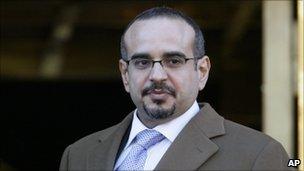Splits inside Bahrain's ruling al-Khalifah family
- Published

Crown Prince Sheikh Salman is seen as a reformer
As the situation in Bahrain continues to deteriorate, splits in the ruling al-Khalifah family are beginning to surface.
A source close to the family told me that on Sunday morning, Crown Prince Sheikh Salman bin Hamad al-Khalifah was close to reaching a breakthrough with pro-democracy activists on terms that would allow a dialogue to begin.
Thus far, a coalition of religious and secular groups had refused to meet with the government until key demands were met.
The crown prince had offered a parliament with "full legislative authority", a government that represents the will of the people, and an end to gerrymandered electoral districts that had ensured the majority Shia population was held to a minority of seats.
By any standards, these represented significant concessions.
Caught in the middle
However, that afternoon, security police attacked protesters at Bahrain University and in the vicinity of Pearl Square.
On Monday, Saudi troops rolled into the kingdom down the causeway that links Saudi Arabia to Bahrain. They were called in by the ruling family to help quell the unrest.
The contingent, reported to be 1,000 strong, is in army barracks about 20km (12 miles) from Pearl Square. It is believed they intend to guard key facilities such as oil and gas installations and financial institutions.
Pro-democracy activist Nabeel Rajab described the arrival of the troops as "an occupation".
"This is an internal dispute. The al-Khalifahs are sending foreign troops against peaceful demonstrators," he said.
On Wednesday morning, Bahraini troops moved in to clear protesters from their makeshift camp in Pearl Square. Three protesters and two policemen were killed in the clashes, taking the toll from the month-long unrest to at least 13 deaths.
Riot police have cleared Pearl Square, the symbolic heart of the opposition campaign
Government insiders acknowledge that the al-Khalifahs are divided.
The Crown Prince is seen as a moderate willing to talk to protesters.
His uncle - Sheikh Khalifah bin Salman al-Khalifah - prime minister for more than 40 years is a hardliner.
The king, Hamad, is caught somewhere in the middle.
He has allowed his son to take a leading role, but when a solution appears close, the hardliners intervene.
Saudi pressure
And King Hamad is facing additional pressure from Saudi Arabia.
Two weeks ago, I was told by a source in Riyadh close to the interior minister Prince Nayef, that the ruling House of Saud simply would not allow the Khalifahs to fall.
The Saudi royals are increasingly worried that if the Khalifahs give in to the pro-democracy movement, a Shia-led government will come to power in Bahrain.
That would put further pressure on the House of Saud to ease discrimination against Shia in the country's oil-rich Eastern Province.
Demonstrations have already broken out there in spite of a government ban.
The arrival of Saudi forces underscores the growing inability of the Khalifahs to deal with the crisis.
Activist Mohamed al Maskati described the presence of foreign troops as a "humiliation" for the Khalifas.
"They will have to step down," he said.
But that's not about to happen.
With the hardliners once again in the ascendancy in Bahrain, and Shia anger growing, the potential for further violence, this time involving foreign troops, appears worryingly close to becoming a reality.